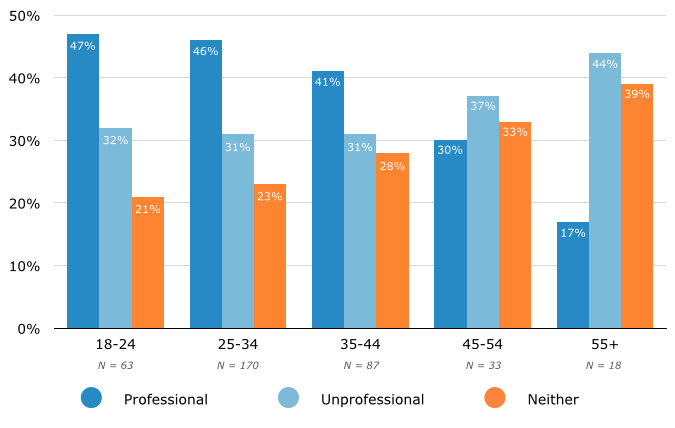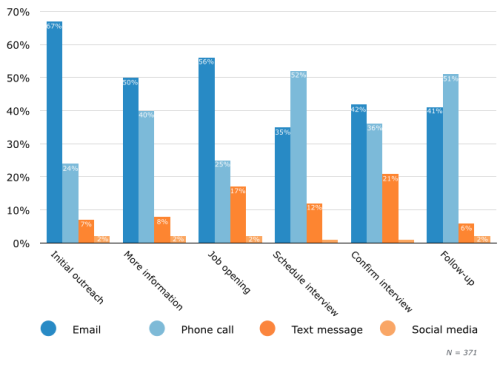 Recently, I retweeted a lengthy article from technology reviewer Software Advice about recruiter text messaging and whether or not job seekers prefer this method of communication. I thought it was fascinating research, so today I’d like to summarize some of those findings for you here.
Recently, I retweeted a lengthy article from technology reviewer Software Advice about recruiter text messaging and whether or not job seekers prefer this method of communication. I thought it was fascinating research, so today I’d like to summarize some of those findings for you here.
First off, research indicates that as many as 60 percent of recruiters now use text messaging to communicate with job candidates as part of their process. In fact, I’ve suggested it myself in this blog. And, I still maintain that text messaging CAN be a great way to communicate with candidates. However, as with so many things in life, the adage “know your audience” must be considered when using text messaging. (NOTE: The report from Software Advice assumes that job seekers have opted-in to receiving recruiter text messaging – if you have not EXPLICITLY obtained permission to text your job seekers, don’t do it!)
Here are a few of the most important take-aways:
Job seekers under the age of 45 mostly consider recruiters who send text messages professional (43% of respondents). Only 30% of job seekers aged 45-54 consider text messaging professional, and for candidates 55 or older, it dropped to a paltry 17% of respondents.

graph courtesy of: Software Advice
Next, even though recruiter text messaging is considered ‘professional,’ there are NO scenarios in which a job seeker PREFERS text messaging over other methods of communication. Job seekers are most agreeable to receiving a text message to confirm a job interview, but even then only 21% of respondents prefer this. For six common scenarios—initial outreach, to obtain additional information, to tell them about a job opening, to schedule an interview, to confirm a job interview time, and to follow-up post-interview—job seekers STRONGLY PREFER to be contacted via email or phone. Recruiter tip: don’t use text messaging for messages that are lengthy, or require two-way conversation.

graph courtesy of: Software Advice
Software Advice also asked job seekers if there were any scenarios in which recruiter text messaging is completely inappropriate. Survey responses varied widely for this question, often based on personal preference. However, 24% of job seekers do not want to receive texts during non-business hours. One respondent defined that as anything earlier than 9AM or later than 5PM, while another indicated that only texts received in the middle of the night would be considered “non-business hours.” Eleven percent of survey respondents indicated that interview follow-up should not be delivered via text messaging. For starters, the follow-up is often too lengthy for a single text message. Furthermore, it’s fairly normal to have some back-and-forth conversation about the follow-up. Text messaging is not a great medium for detailed conversations. If there is negative feedback to share, my opinion is that should ALWAYS be delivered in a phone call.
In conclusion, recruiter text messaging is an acceptable communication method. Recruiters are advised to be sure job seekers have expressly opted-in to receiving text messages. It is also a good idea to ask job seekers to indicated their PREFERRED communication mode. Pay attention to time of day, don’t send lengthy texts, and pick up the phone EVERY TIME the conversation warrants it.
What is your experience with text messaging?


Hi Veronica
I generally only use text messaging to check an appointment or interview and if I know the candidate can’t take calls at work. I receive text messages from candidates quite often and certain amongst the under 40s it seems quite an acceptable form of communication. As you say it’s just a quick message nothing long.
Most people have access to their emails on their phones anyway and often I see a reply to an email has been sent from a phone.
Thanks, Paulette! I was a *little* surprised that so few job seekers PREFER to receive text messages over other modes of communication. One more reason to use the phone!
Hi Veronica,
When kind of text messaging do you refer in this post?
+ SMS
+ Email
+ Text messages like WhatsApp, LinkedIn ?
Thanks in advance,
Hi Marc, this message is specifically about SMS-type messaging, but not about a particular platform. I often use Whatsapp for international texting and would consider that an SMS service when used in this way, along with SMS through a mobile provider.
Ok! Thanks a lot Veronica.
Personally, I block any incoming text messages from a person with whom I have not spoken or given authorization to use my phone this way. This has become a way recruiters harass candidates who decline their phone calls. I typically receive a call while at work, send it to voicemail, they leave no message and call again. I decline again, then they paste the content of an email into text causing my phone to continue to have notifications. I send “stop” back and it does not resolve the issue.
I consider it completely unacceptable without authorization. I don’t have a text plan on my cell phone, and see no reason to purchase one. Any recruiter who texts me is instantly added to my blocked list.
Hi JL, absolutely agree that advance permission is a MUST!
Absolutely unprofessional to text without permission. Texting is highly personal. If you have an established relationship that might be OK, but sending cold texts is an absolute no no. If it is an appointment reminder, that’s one thing, but texting me when I don’t know you from beans hell no.